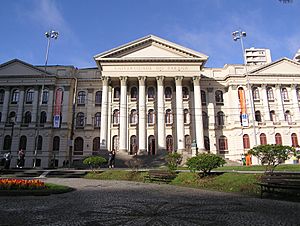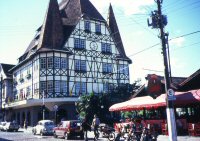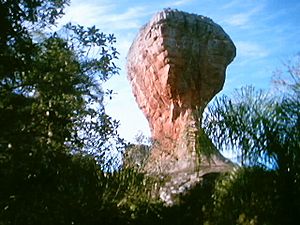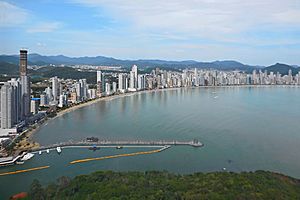South Region of Brazil facts for kids
Quick facts for kids South Region |
|
| Região Sul | |
| Region of Brazil | |
| Country | |
|---|---|
| States | Paraná, Santa Catarina, Rio Grande do Sul |
| Largest cities | Curitiba, Porto Alegre, Joinville |
| Highest point | Pico Paraná |
| - location | Southern Brazilian Highlands, Paraná |
| - elevation | 1,877 m (6,158 ft) |
| - coordinates | 25°15′S 48°48′W / 25.250°S 48.800°W |
| Lowest point | Sea level |
| - elevation | 0 m (0 ft) |
| Area | 576,774.31 km² (222,694 sq mi) |
| Population | 29,439,773 (1 January 2016) |
| Density | 51 /km² (132 /sq mi) |
The South Region of Brazil (Portuguese: Região Sul do Brasil) is one of the five main areas of Brazil. The Brazilian Institute of Geography and Statistics created these regions in 1969. This region includes three states: Paraná, Santa Catarina, and Rio Grande do Sul.
Contents
Exploring the South Region of Brazil
The South Region is the smallest area in Brazil. It covers about 576,774.31 km2 (222,693.81 sq mi). This region is special because it's the only part of Brazil outside the tropical zone. This means it has clear seasons. In winter, you can expect frost and sometimes even snow.
The land here is mostly flat or gently rolling. A large plateau covers much of the area. The South Region borders Mato Grosso do Sul and São Paulo states to the north. To the east, it meets the Atlantic Ocean. To the south, it borders Uruguay, and to the west, Argentina and Paraguay.
 |
Mato Grosso do Sul | São Paulo |  |
|
| Argentina and Paraguay | Atlantic Ocean | |||
| Uruguay |
Rivers and Waterways
The South Region has three main river systems. These are the Paraná River, the Uruguay River, and the rivers of Southeast Brazil.
The rivers in this region are very important. People use them for navigation, watering crops, and getting water for cities. They also help create power. The biggest rivers have a lot of potential for hydroelectric power. The Itaipu Dam on the Paraná River is a great example. It produces a lot of electricity for the South and Southeast regions of Brazil.
Mountains and Landforms
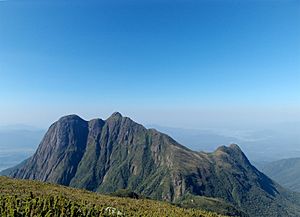
The land in the South Region has many plateaus. These flat areas can be over 1,000 meters (about 3,280 feet) above sea level. They generally get lower as you go west. This whole area is called the Southern Plateau of Brazil. It covers about three-quarters of the region.
Here are the highest points in each state of the South Region:
| State | Mountain | Elevation |
|---|---|---|
| Paraná | Pico Paraná | 1,877 m (6,158 ft) |
| Santa Catarina | Morro da Boa Vista | 1,827 m (5,994 ft) |
| Rio Grande do Sul | Monte Negro | 1,398 m (4,587 ft) |
Weather and Climate
The South Region is almost entirely in a subtropical climate. This makes it the coldest part of Brazil. Frost is common, and some places even get snow. The rains are spread out evenly throughout the year.
Average yearly temperatures here range from 12 °C (53.6 °F) to 22 °C (71.6 °F).
States of the South Region
The South Region is made up of three states: Paraná, Santa Catarina, and Rio Grande do Sul.
| Code | State | Capital | Cities | Population (2016) |
Area (km2) |
Density (people/km2) |
|---|---|---|---|---|---|---|
| BR-PR | Curitiba | 399 | 11,242,720 | 199,307.94 | 56.4 | |
| BR-RS | Porto Alegre | 497 | 11,286,500 | 281.737.89 | 40.1 | |
| BR-SC | Florianópolis | 295 | 6,910,553 | 95,737.95 | 72.2 | |
| Total | 1,191 | 29,439,773 | 576,783.78 | 51.0 | ||
People and Culture
The South Region's culture is very unique. This is because of how it was settled and the people who came here. Not many black slaves were brought here. Instead, many Caucasian immigrants arrived. These Europeans made the population mostly white. They also brought their traditions and ways of farming. They set up many medium and small farms.
The South Region has good social indicators. It has the highest HDI in Brazil (0.831). This index measures things like life expectancy, education, and income. The region also has the third highest income per person in the country. Most of the people (94.8%) live in cities.
Many cities here are known for their good urban planning. Curitiba and Maringá are great examples. The region has a high standard of living. It also has a high literacy rate of 94%.
Some famous places in the South Region include the Iguaçu Falls. These falls are a Natural Heritage site and one of the New 7 Wonders of Nature. The Ruins of St. Michael of the Missions are also a Cultural Heritage site. The Itaipu Dam is considered one of the seven modern Wonders of the World. You can also visit charming winter cities in the mountains of Santa Catarina and Rio Grande do Sul. The Botanical Garden of Curitiba is a well-known symbol of the region.
History of the South Region
The first people to live in southern Brazil were indigenous people. Later, Spanish Jesuit priests arrived. They wanted to teach the Native Americans about their religion and control the land. But pioneers from São Paulo attacked these missions. They wanted to capture the Native Americans. So, the Jesuits and Native Americans left the area.
Cattle were left behind and roamed freely. The São Paulo pioneers then became interested in trading these cattle. As they moved the cattle, new villages started to grow along their paths. For many years, the Portuguese and Spanish fought over who owned the land in this region.
The population of the South grew a lot with the arrival of European immigrants. This happened in the 1800s and 1900s. Many Germans, Italians, Poles, and Ukrainians moved here. The region also welcomed people from Japan, Arab countries, and Jews.
Population and Cities
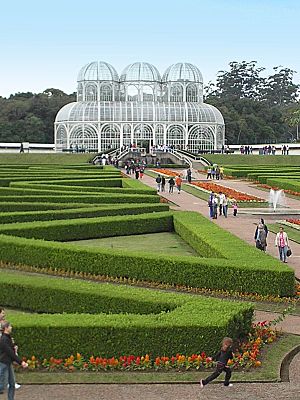
As of July 1, 2016, the South Region had a population of 29,439,773 people. This means there were about 51.0 people per square kilometer.
Curitiba, the capital of Paraná state, has the largest population and the biggest economy. Porto Alegre, the capital of Rio Grande do Sul, has the largest metropolitan area.
Here are the 10 largest cities in the South Region by population:
| Rank | City | State | Population (2016) |
|---|---|---|---|
| 1 | Curitiba | Paraná | 1,893,997 |
| 2 | Porto Alegre | Rio Grande do Sul | 1,481,019 |
| 3 | Joinville | Santa Catarina | 569,645 |
| 4 | Londrina | Paraná | 553,393 |
| 5 | Caxias do Sul | Rio Grande do Sul | 479,236 |
| 6 | Florianópolis | Santa Catarina | 477,798 |
| 7 | Maringá | Paraná | 403,063 |
| 8 | Blumenau | Santa Catarina | 343,715 |
| 9 | Pelotas | Rio Grande do Sul | 343,651 |
| 10 | Canoas | Rio Grande do Sul | 342,634 |
Ethnic Groups and Languages
Many European immigrants came to the South Region in the 1800s. They greatly influenced the people and culture here. The main ethnic groups in Southern Brazil are of Portuguese, Italian, and German descent.
Portuguese is the official language of Brazil, and everyone in the South Region speaks it. However, in some areas, people also speak dialects of German or Italian. Some villages even use the original languages of the immigrants. In Porto Alegre and Curitiba, you might find some people who speak Yiddish.
| Skin Color/Race (2006) | |
|---|---|
| White | 79.6% |
| Black | 3.6% |
| Brown | 16.0% |
| Asian or Amerindian | 0.7% |
Tourism in the South Region
The South Region offers many attractions for tourists. These include beautiful natural areas, lovely beaches, historic cities, and towns with European influences. The distinct seasons, especially the cold winter, also draw visitors.
In Paraná, the Iguaçu Falls are a huge draw. Thousands of tourists visit them every year. They are the main destination for foreign visitors in the region. The state also has a geological site called Vila Velha. It's about 340 million years old and has huge rock formations. The capital, Curitiba, is considered the best southern city for tourism.
In Santa Catarina, the beaches are very popular. Many people also visit the winter towns in the state's mountains.
Rio Grande do Sul state, like Santa Catarina, attracts tourists in winter. People come to its mountain cities where the weather is very cold.
Images for kids
-
View of the Iguaçu Falls (Foz do Iguaçu, Paraná), one of New 7 Wonders of Nature.
-
Iguaçu Falls, in Paraná.
-
Saint Francis Waterfall, Paraná.
-
The ruins of St. Michael of the Missions is a Unesco World Heritage site in Rio Grande do Sul.
-
The Hidroelétrica de Itaipú dam.
-
The Universidade Federal do Paraná is the oldest Brazilian university.
 | Delilah Pierce |
 | Gordon Parks |
 | Augusta Savage |
 | Charles Ethan Porter |


